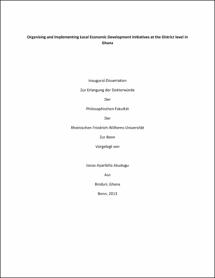Organising and Implementing Local Economic Development Initiatives at the District level in Ghana

Organising and Implementing Local Economic Development Initiatives at the District level in Ghana

| dc.contributor.advisor | Gerke, Solvay | |
| dc.contributor.author | Akudugu, Jonas Ayaribilla | |
| dc.date.accessioned | 2020-04-18T15:19:14Z | |
| dc.date.available | 2020-04-18T15:19:14Z | |
| dc.date.issued | 20.12.2013 | |
| dc.identifier.uri | https://hdl.handle.net/20.500.11811/5595 | |
| dc.description.abstract | The term Local Economic Development (LED) is not is not new, but has an emerging context and usage. The contemporary local economic development approach is conceived as a development strategy that taps the synergy of multiple actors, including central government, local governments, private sector operators and community groups, to facilitate the joint design and implementation of initiatives to stimulate the local economy and productive activity with the view of expanding the range and growth of economic activities and creating jobs for the local residents. The contemporary local economic development approach is increasingly seen as a viable alternative to traditional top-down development strategies which have largely failed to generate meaningful and sustainable economic development at the local level. Since 2003, efforts have been made to promote the contemporary local economic development approach at the district level in Ghana. This study explores how the local economic development approach is promoted and how the interaction between the key (organisational) actors is shaping its practice in the country, particularly at the district level. From an actor-oriented perspective, this study explores how the local economic development approach is evolving as a development strategy and how it is promoted at the District level in Ghana. I demonstrate that the promotion of the local economic development approach at the district level in Ghana is not a mere implementation of a planned intervention/development strategy, but an intervention process shaped by the interaction between local, national, and international (organisational) actors, structural factors and multiple rationalities. The research was conducted in the Berekum Municipal in the Brong Ahafo Region and the Bongo District in the Upper East Region of Ghana. From the cases studied, I found out that the contemporary local economic development approach has prospects or potentials in galvanising the efforts of development actors and local resources into propelling economic development at the district level in Ghana. However, the successful promotion of the contemporary local economic development approach in Ghana is negatively affected by a number of factors: the top-down approach to its implementation, a poorly formulated national LED policy that is incapable of providing strategic direction for LED promotion, capacity constraints of the District Assemblies, as well as the existence of multiple and divergent actor rationalities regarding the promotion of local economic development at the district level in Ghana. Based on these findings, I conclude that the approach and attitude adopted by the key actors to local economic development promotion is the bane to its success. The old approach and attitude to implementing new development strategies like the contemporary local economic development approach runs counter to the biblical admonition that, “no one pours new wine into old wineskins”. | en |
| dc.language.iso | eng | |
| dc.rights | In Copyright | |
| dc.rights.uri | http://rightsstatements.org/vocab/InC/1.0/ | |
| dc.subject | Entwicklung | |
| dc.subject | Akteure | |
| dc.subject | Förderung | |
| dc.subject | Intervention | |
| dc.subject | Implementierung | |
| dc.subject | Development | |
| dc.subject | Actors | |
| dc.subject | Promotion | |
| dc.subject | Implementation | |
| dc.subject.ddc | 300 Sozialwissenschaften, Soziologie, Anthropologie | |
| dc.title | Organising and Implementing Local Economic Development Initiatives at the District level in Ghana | |
| dc.type | Dissertation oder Habilitation | |
| dc.publisher.name | Universitäts- und Landesbibliothek Bonn | |
| dc.publisher.location | Bonn | |
| dc.rights.accessRights | openAccess | |
| dc.identifier.urn | https://nbn-resolving.org/urn:nbn:de:hbz:5-34467 | |
| ulbbn.pubtype | Erstveröffentlichung | |
| ulbbnediss.affiliation.name | Rheinische Friedrich-Wilhelms-Universität Bonn | |
| ulbbnediss.affiliation.location | Bonn | |
| ulbbnediss.thesis.level | Dissertation | |
| ulbbnediss.dissID | 3446 | |
| ulbbnediss.date.accepted | 05.12.2013 | |
| ulbbnediss.fakultaet | Philosophische Fakultät | |
| dc.contributor.coReferee | Evers, Hans-Dieter |
Dateien zu dieser Ressource
Das Dokument erscheint in:
-
E-Dissertationen (690)




